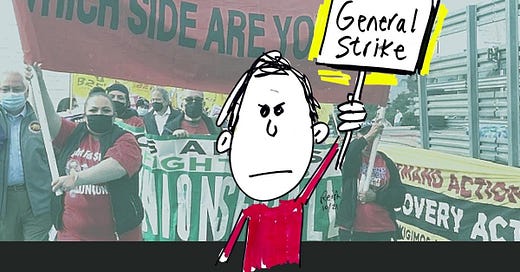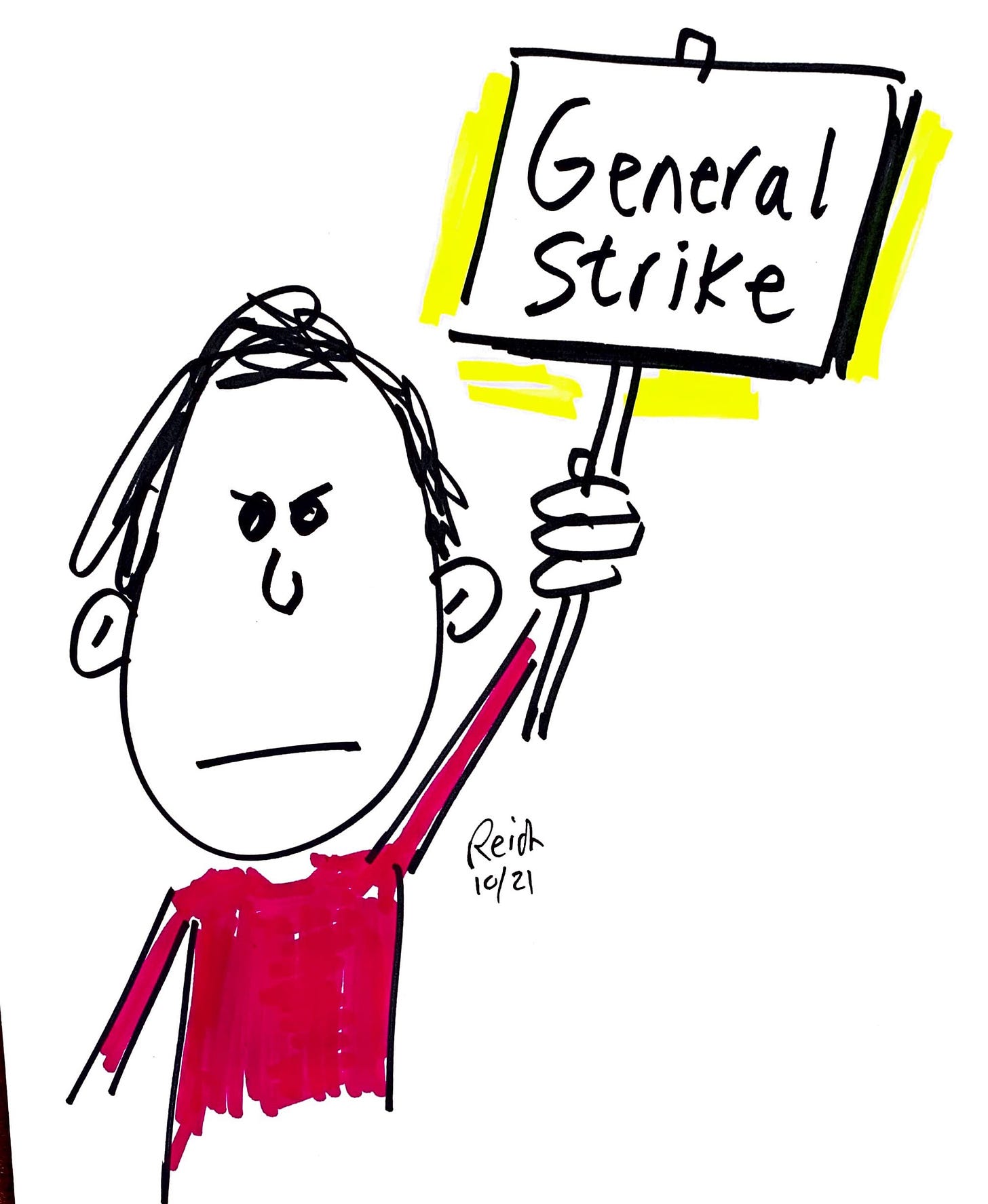Why yesterday's bad news about jobs is really good news
The media is missing the big story.
I’d planned to take today off from writing but I’m riled up about how the media is characterizing Friday’s jobs report and I have to speak out.
The coverage was almost universally gloomy. The New York Times emphasized “weak” jobs growth and fretted that “hiring challenges that have bedeviled employers all year won’t be quickly resolved,” and “rising wages could add to concerns about inflation.” For CNN, it was “another disappointment.” For Bloomberg the “September jobs report misses big for a second straight month.”
The media failed to report the big story: American workers are now flexing their muscles for the first time in decades. You might say workers have declared a national general strike until they get better pay and improved working conditions.
They don’t call it a general strike, of course. But in its own disorganized way it’s related to the organized strikes breaking out across the land – Hollywood stagehands, John Deere workers, Alabama coal miners, Nabisco workers, Kellogg workers, nurses in California, healthcare workers in Buffalo.
Disorganized or organized, American workers now have bargaining leverage to do better. After a year and a half of the pandemic, consumers have pent-up demand for all sorts of goods and services.
But employers are finding it hard to fill positions. Yesterday’s job report showed the number of job openings at a record high. The share of people working or looking for work (the labor force participation rate) has dropped to 61.6 percent. Participation for people in their prime working years, defined as 25 to 54 years old, is also down.
These numbers have nothing to do with the Republican bogeyman of extra unemployment benefits supposedly discouraging people from getting jobs. The extra benefits ran out on Labor Day.
The reluctance of workers to return to their old jobs has everything to do with them being fed up. Some have retired early. Others have found ways to make ends meet other than a job they abhor. Many just don’t want to return to backbreaking, low-wage shit jobs. In the wake of so much hardship, illness and death during the past year, I think many peoples’ priorities have shifted.
The media and most economists measure the economy’s success by the number of jobs it creates, while ignoring the quality of those jobs. But when I was Secretary of Labor I met with working people all over the country who complained that their jobs paid too little and had few benefits, or were unsafe, or required lengthy or unpredictable hours. Many said their employers treated them badly, harassed them, and did not respect them.
In order to lure workers back, employers are now raising wages and offering other inducements. Average earnings rose 19 cents an hour in September and are up more than $1 an hour – or 4.6 percent -- over the last year.
Clearly, that’s not enough.
Corporate America wants to frame this as a “labor shortage.” But what’s really going on is more accurately described as a living-wage shortage, a hazard pay shortage, a childcare shortage, a paid sick leave shortage, and a health care shortage.
Unless these shortages are rectified, many Americans won’t return to work anytime soon. That’s the real lesson of yesterday’s jobs report.
I say it’s about time.




We have a "shit jobs" problem in this country. Every job should be seen as dignified and every worker should be treated with respect. When we tried to raise the minimum wage, Republicans argued that low-payed jobs where workers are treated poorly were a necessary incentive for people to move up, and that young people need to start their working lives at a bad job so they can appreciate having a good one. Ridiculous! And very out of touch with who actually works these jobs.
If you start your working life in a job where you're treated with dignity and respect you will want to work your whole life. If you are abused and under-payed, all you'll learn is that working is unpleasant and something to avoid if possible.
Hopefully this labor shortage leads to more employers treating their workers with the respect they deserve.
You are talking to the converted (usually) with these posts. You should be writing to the general public in newspapers and tv segments. If they misrepresent the Democratic stance on issues, then we need to write and produce our own stories. The 2022 election is a year away and we need to reach the non-voter, one-issue Republican voter who don't watch or read anything. While Republicans are already airing negative campaigns, Democrats can produce short segments explaining our stance on various topics from the right and far right point of view. There is no time for door to door campaigning. We need a new version of fireside chats to explain hot button words like socialist and the history of the rise of the middle class. Explain Dems vision of the future in the 21st century with new challenges such as climate change, dwindling natural resources, etc. Your clips I've seen on YouTube are a good start for the TV segments but need to be longer and places where people who have tuned out of politics will see them. A more positive future than the doom and gloom old man Republican party. I've been hearing the word nihilist in regard to the extreme right. Try throwing that word at them when they accuse Dems of being socialists.